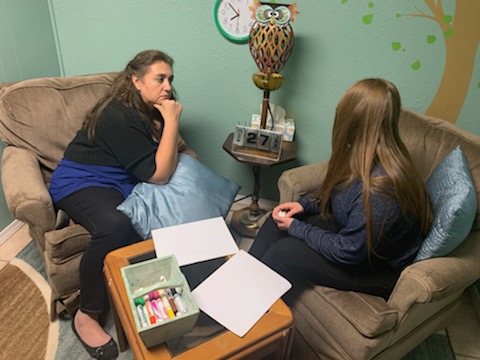
Zelma Lopez, left, director of the Cavern City Advocacy Center, on Jan. 29. | Cavern City CAC
It was a bleak time for many foster youth and their families in need when Kids’ Safehouse ceased operations in January 2015, remembers Zelma Lopez.
“For three to six months, there was nowhere to go,” said Lopez, a former interviewer at Kids’ Safehouse who started Cavern City Child Advocacy Center (CAC) in Carlsbad, N.M., in April 2015 to fill the behavioral service abyss. “It was desperate times in this area for a little while.”
Add the effects of the Permian Basin oil boom, which is a topic of daily conversation for longtime Carlsbad residents, and the already tough road is bumpier for vulnerable children and their parents in Eddy County.
“You have low resources anyway. You bring in more people and the cost of housing is crazy and families live in little homes or one or two bedrooms,” said Lori Hill, executive director of Eddy County Court Appointed Special Advocates (CASA). “It’s probably putting a lot of stress on the families.” The rate of substantiated cases of child abuse or neglect in Eddy County rose 28.5% from July 2017 to June 2019, the 360 Quarterly Report by the state Children, Youth and Families Department shows.
Working together
Due to the precarious situations that confront youth in care in Carlsbad, Cavern City CAC and Eddy County CASA are in the process of pooling their child welfare knowhow to try to combat the overall lack of services in southeastern New Mexico. Though it’s too soon to tell if it’s paying off, Lopez says she’s optimistic about the future for Eddy County’s foster youth.
Cavern City CAC originally started delivering Sexual Assault Nurse Examiner (SANE) medical treatment for victims of sexual violence or assault as well as forensic child interviews. But due to the drought of mental health service options in the area, Lopez decided to open the Lea County Child Advocacy Center in Hobbs, 70 miles to the east. She has also expanded services to include additional trauma-focused and evidence-based therapies.
Today, Cavern City and Lea County CAC offers a handful of mental health services, including cognitive behavioral therapy, where a child composes a survivor narrative, and child-family traumatic stress intervention, the only such program in the state, Lopez said, which alleviates post-traumatic stress reactions to disturbing events. Additionally, the nonprofit recently introduced rapid eye movement therapy, which is believed to reprogram physical manifestations of traumatic and painful events for a child via bilateral stimulation.
Any youth in state care is eligible for Cavern City and Lea County CAC services. Brandi Ackland, a clinician at Cavern City CAC who coordinates trauma mental health services, estimates that she and a part-time clinician together serve up to 40 kids at a time in the Carlsbad area. Overall, Lopez says the organization currently assists more than double the amount of kids (approximately 400 in a year) compared to the Kids’ Safehouse days (170 kids annual average).
When unusual or complex situations arise beyond their capabilities, they try to refer victims to appropriate follow-up services. However, that’s not always possible, due to a global absence of options in the area.
“Finding bilingual services is ridiculously hard,” Ackland said. “We can’t even send someone to the emergency room and guarantee that there’s going to be someone there that can speak Spanish for them. Being in New Mexico and this close to the border, it’s surprising that we don’t have more bilingual services.”
[Related: CYFD Forging Ahead With Native American Court, Kinship Care]
[Related: Las Cruces Expanding ‘One-stop Shop’ of Services at Community School to Another]
[Related: McKinley County Could Benefit From New Court For Tribes]
[Related: Native American Court to Run Under Bigger Concept of Family]
She added, “If you don’t have family in the area, you almost have to return to your abuser because you can’t take your family and live in your car, and shelters around here are pretty limited. Transitional housing caps the number of children you can take with you and the ages of your kids. There are a lot of different situations that are causing a lot of heartache in this area.”
Hill of Eddy County CASA says a systematic weakness of the system exists for victims of sexual abuse: Specialized services may not be close to home.
“A lot of times, CYFD sends them to specialized foster treatment care, which deals with [sexual abuse] issues,” Hill said. “We have Carlsbad kids that might be living in foster treatment care or a residential treatment center in Rio Rancho, Taos or Las Cruces,” which is a minimum three-hour drive from Carlsbad.
Hill, a former state juvenile probation officer who took over Eddy County CASA in December 2018, explains that her organization, which trains court advocates for youth in care in the Fifth Judicial District, struggles to find a sufficient volume of volunteers. The organization, whose goal is a one-to-one volunteer-to-youth ratio, averages approximately 35 volunteers who serve up to 125 kids at a time.
“We’d like to see a volunteer stay with a case the entire time with the child, from coming into the legal system to either reunification, adopted out or aging out, but life happens,” Hill said. “Sometimes the volunteer moves or something happens within their own personal life. Right now, we’re in bad need of volunteers.”
Despite the challenges, Lopez has found crossover between the work Cavern City CAC performs and Eddy County CASA’s mission. A stronger partnership between the two made sense.
“There are occasions where a child who’s in foster care will say something to a foster parent or something will trigger them having to come to our agency,” Lopez said. “We’re really trying to find ways where a CASA advocate who already knows the kid would be able to accompany the child to their exams to make it a little less scary.”
Hill added, “This work is very hard and very emotional … but we’re doing our very best.”
This story is part of a Youth Today project on foster care in New Mexico. It’s made possible in part by the May and Stanley Smith Charitable Trust. Youth Today is solely responsible for the content and maintains editorial independence.



























